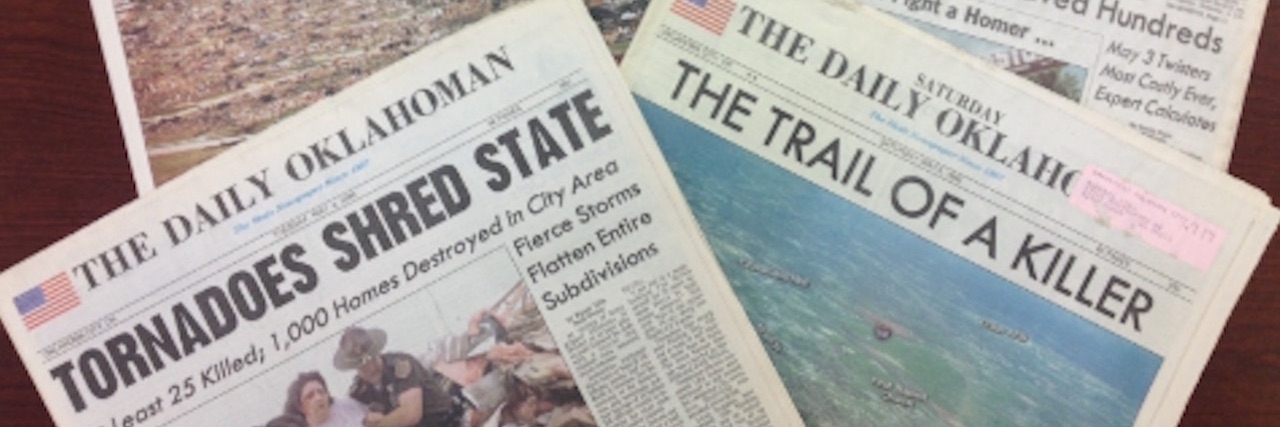Post-traumatic stress disorder (PTSD) is commonly thought of as something only soldiers experience. I know I thought that until 2013 when I was given that diagnosis. My trauma is from surviving the largest tornado outbreak in Oklahoma history. I was 8 at the time.
May was the 17th anniversary of that outbreak and in hopes of spreading awareness that PTSD is not limited to people in the armed forces, I would like to share what it felt like then and now, 17 years later.
I am 8 years old and I am at a friend’s house on a sunny spring afternoon, staring into his closet at a clay pottery wheel, but he says we can’t play with that.
I am 8 years old and my mother has come to pick me up. She says we need to get a few things from home.
I am 8 years old and I am laying in the bathtub in the manager’s apartment of the Motel 6, where my mom is the manager on duty. She had to come get all the guests off the second floor.
I am 8 years old and my older sister is sandwiched between the tub and toilet with a flashlight pointed in my face trying to get me to sing songs to distract me but all I can say is, “We’re all going to die.”
I am 8 years old and I can hear the adults in the living room just a few feet away saying their goodbyes.
I am 8 years old and I can hear the tornado outside; it sounds like a train. It is so loud I feel as if I’m standing on the tracks.
I am 8 years old sitting on a bed in one of the motel rooms. I think someone handed me food but all I’m aware of is the weather man’s report on the TV. Someone says it turned at the last minute.
I am 8 years old and I am sitting in the back of my mother’s car with my sister looking at what they say is… was our house but the only discernible marker is the house numbers painted on the curb.
I am 8 years old and people are digging other people out of rubble.
I am 8 years old and an older woman with mud and blood on her face is standing outside the car asking if we’re OK. I think my sister answers.
I am 8 years old and the air is hot and sticky and smells like gas.
I am 8 years old and some people are at my neighbor’s house picking up stuff off the ground and doing something in the back of that red truck.
I am 8 years old and those people are trying to save that man’s life.
I am 8 years old and he dies.
I am 8 years old and everything we own fits in a plastic Wal-Mart bag.
I am 8 years old and my Granny has come to take me to her house.
I am 25 years old. I am a mother and wife. I am happy and healthy. I am 25 years old and the sky clouds up and the rain starts to pour and the sirens go off and… I am 8 years old. I am in the bathtub. She is shining the light in my face. The adults are saying goodbye. I am standing on the tracks. I can smell the gas in the humid air. And I am going to die.
PTSD does not affect only veterans, though we tend to think of them when we hear the word. After the tornado on May 3, 1999, there were no mental health services directed at people who had experienced this traumatic event. Even now when you Google PTSD, you’d have to do quite some digging to find resources beyond the armed forces community. That has to change.
When, in the beginning of every spring since then, I packed bags to guarantee we’d have belongings after the inevitable disaster that was coming, should have been a red flag. Suffering a panic attack and crying so hard I couldn’t breathe any time it rained should have been a red flag.
But it wasn’t, not even to myself because I too didn’t connect PTSD to anyone beside veterans. Breaking down the stereotype of who is affected by PTSD is a gateway to getting services to survivors. Because no one should be afraid of the rain.

